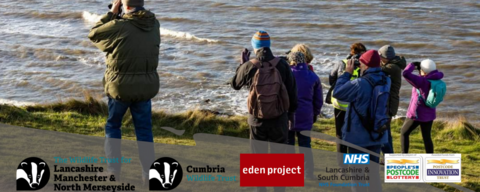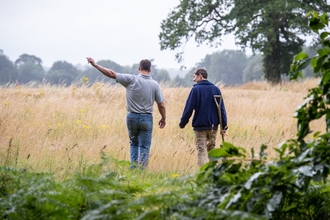Working together for wildlife
Cumbria Wildlife Trust works in partnership with other organisations to achieve the best results for wildlife and connecting people with nature. We also support special interest groups, which are made up of volunteers and experts in a particular field.
What is the Cumbria Peat Partnership about?
It brings stakeholders together to share knowledge, develop best practice and actively support the restoration, stewardship and the long-term future of the wide range of valuable peat habitats in Cumbria.
The Cumbria Peat Partnership will actively support the restoration and better stewardship of peatland habitats with the aim of delivering:
- Flood Risk Management
- Biodiversity, Water Resources
- Water Quality
- Carbon Storage
- Water Framework Directive benefits
Who is a member of the Cumbria Peat Partnership?
Representatives from the following organisations will form the membership of the partnership:
- Cumbria Wildlife Trust (CWT)
- Environment agency (EA)
- Fix the Fells
- Lake District National Park Authority (LDNPA)
- Moorland Association
- National Farmers Union (NFU)
- Natural England (NE)
- Royal Society for the Protection of Birds (RSPB)
- The Forestry Commission (FC)
- The National Trust (NT)
- United Utilities (UU)
- Yorkshire Dales National Park Authority (YDNPA)
More information?
If you'd like to find out more about the Cumbria Peat Partnership and its
work please email mail@cumbriawildlifetrust.org.uk or telephone 01539 816300.
Cumbria Peat Partnership Annual Report 2023-2024
Cumbria Peat Partnership (CPP) terms of reference PDF
Cumbria's dark skies allow us to see the natural wonder of the stars, but are also critical for the health wildlife and our own natural well-being. Sadly light pollution in Cumbria is increasing each year, threatening to obscure our view of the stars and blinding and confusing animals so they can’t feed or find a mate.
Discover more about The Friends of the Lake District project to stop light pollution.
Regionally Important Geological and Geomorphological Sites (RIGS) were originally designated as important places for geology and geomorphology outside statutorily protected land such as Sites of Special Scientific Interest (SSSI).
This has changed and RIGS have become ‘Local Geological Sites’ (LGS) which, importantly, are recognised by local planning authorities; Cumbria GeoConservation gets consulted if any proposed development impinges on an LGS.
This is a means of safeguarding important Earth science and landscape features for future generations to enjoy.
Further information about local geology and a map showing the location of Local Geological Sites can be found on the CumbriaGeoConservation website
For all the Local Geological Sites that can be visited without seeking permission, 'Site Data Sheets' can be downloaded from the CumbriaGeoConservation website and for some sites there are non-technical leaflets to download.
The aim of the group is to facilitate the well planned and managed reintroduction of beavers to Cumbria through the delivery and support of enclosed scientific beaver release trials, as well as community engagement and advocacy.
- Beavers are native to Britain but were wiped out in the 16th century, mainly due to hunting.
- Beavers are completely vegetarian and do NOT eat fish.
- Beavers can provide a range of environmental and socio-economic benefits. These include flood risk alleviation, improved water quality, habitat creation for other wildlife and increase revenue for the local economy through nature-based tourism.
- The proposed release schemes in Cumbria are enclosed scientific trials and will only take place if a license is granted and funding can be obtained. They are not for free roaming beavers so they will be unable to move into the wider surrounding countryside.
- In the long term, the Cumbria Beaver Group would like to see beavers return to Cumbria. However, it is vital that any reintroduction is well planned, well managed and has the support of the local community.
The Cumbria Mammal group Facebook page is already populated with a number of posts, photographs and videos and new members are always welcome.
As well as being a useful means of sharing observations from around Cumbria the Cumbria Mammal group is planning to run some specialist field meetings with a view to producing the mammal experts of tomorrow.
Cumbria is fortunate in possessing some real experts and if these individuals cast their minds back, they will recall that they were initially shown the ropes by someone willing to share their skills.
The demise of the old Mammals Group and the regional Badger Groups has created a vacuum in this educational area that this new Group intends to fill.


